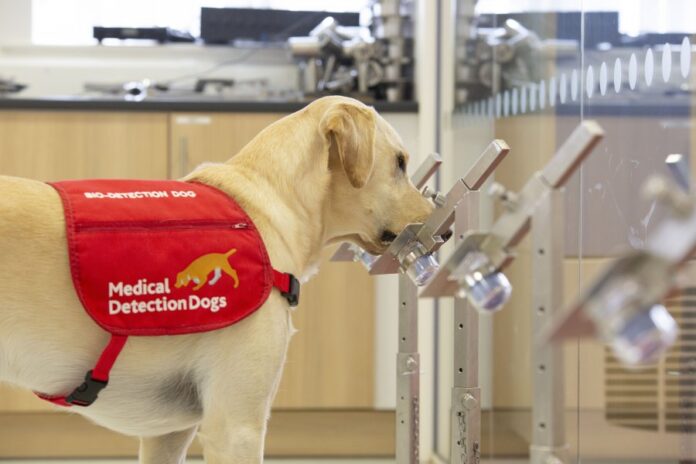Researchers investigating whether bio-detection dogs can detect COVID-19 in humans are asking people in the North West region of England for help with the trial.
Led by the ARCTEC team at the London School of Hygiene & Tropical Medicine (LSHTM) in collaboration with the charity Medical Detection Dogs and Durham University, the trial will determine whether dogs could be used as a new rapid, non-invasive diagnostic tool for the virus. The first phase of the trial is funded by the Department for Health and Social Care (DHSC).
Before the dogs can be put through their paces, the researchers require samples for these super sniffers to carry out their work, and that’s where members of the public can lend a hand.
The research team are aiming to recruit thousands of people in the North West of England, a region which has experienced a recent rise in coronavirus cases, who have mild COVID-19 symptoms and are due to have a swab test, or have had a swab test conducted in the previous 24 hours.
The volunteers will provide samples of breath and body odour by wearing a mask for three hours, and nylon socks and a t-shirt for twelve hours.
They are aiming to collect 325 positive and 675 negative samples – in order to confidently ascertain if these dogs can accurately detect the disease.
Once the samples have been collected, they are taken to the London School of Hygiene & Tropical Medicine for analysis to identify compounds in odour that signify when someone is infected with COVID-19.
The samples are then sent to the Medical Detection Dogs’ training centre in Milton Keynes where six dogs will undergo training to identify the virus from the samples.
Samples from volunteer NHS staff and members of their households who are due to be tested for COVID-19, are also being collected.
Project lead Professor James Logan, Head of the Department of Disease Control at the London School of Hygiene & Tropical Medicine, said: “If successful, this trial could revolutionise how we diagnose the virus. Rapid screening of high numbers of people, even if asymptomatic, will help return our lives back to some sort of normality. A huge thank you to everyone who is supporting this important trial. If you are eligible to join it, we’d love to hear from you.”
Should the trial be successful, these dogs could be deployed to airports in the UK within six months to assist with the rapid screening on people travelling from abroad – with the potential of screening of up to 250 people per hour.
Claire Guest, CEO and Co-Founder of Medical Detection Dogs, said: “It is vital that we train our dogs to detect the odour of COVID-19 as soon as possible so we can help ensure people move about freely and safely. The latest travel disruptions further highlight the difference the dogs could make. Public support is essential in making this possible. Anyone who assists us by providing samples will be playing a part in creating a fast, effective and non-invasive diagnosis for the virus and safer spaces for us all.”
Professor Steve Lindsay, from the Department of Biosciences at Durham University, said: “If we can show that our trained dogs can identify people carrying the virus, but who are not sick, it will be a game changer. We will then be able to scale-up the use of dogs at ports of entry to identify travellers entering the country with the virus. This could be very important to help prevent a second wave of the epidemic.”
More information about volunteering for the study can be found at: https://www.lshtm.ac.uk/research/centres-projects-groups/using-dogs-to-detect-covid-19#volunteer-for-the-study







